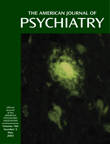Gender Differences in Prevalence, Risk, and Clinical Correlates of Alcoholism Comorbidity in Bipolar Disorder
Abstract
OBJECTIVE: The prevalence of lifetime alcohol abuse and/or dependence (alcoholism) in patients with bipolar disorder has been reported to be higher than in all other axis I psychiatric diagnoses. This study examined gender-specific relationships between alcoholism and bipolar illness, which have previously received little systematic study. METHOD: The prevalence of lifetime alcoholism in 267 outpatients enrolled in the Stanley Foundation Bipolar Network was evaluated by using the Structured Clinical Interview for DSM-IV. Alcoholism and its relationship to retrospectively assessed measures of the course of bipolar illness were evaluated by patient-rated and clinician-administered questionnaires. RESULTS: As in the general population, more men (49%, 57 of 116) than women with bipolar disorder (29%, 44 of 151) met the criteria for lifetime alcoholism. However, the risk of having alcoholism was greater for women with bipolar disorder (odds ratio=7.35) than for men with bipolar disorder (odds ratio=2.77), compared with the general population. Alcoholism was associated with a history of polysubstance use in women with bipolar disorder and with a family history of alcoholism in men with bipolar disorder. CONCLUSIONS: This study suggests that there are gender differences in the prevalence, risk, and clinical correlates of alcoholism in bipolar illness. Although this study is limited by the retrospective assessment of illness variables, the magnitude of these gender-specific differences is substantial and warrants further prospective study.



